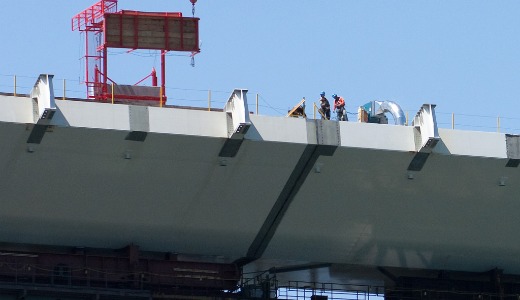
Union leaders are stepping up their call on Congress and the Obama administration to push through, quickly, legislation to create millions of jobs in construction and manufacturing.
Terry O’Sullivan, president of the half-million-member Laborers International Union of North America (LIUNA), said, “There will be much talk about a dramatic shift in the aftermath of the 2010 midterm elections. But here’s what hasn’t changed: Nearly 1 in 10 American workers is unemployed. In the construction industry – a key driver of our economy –nearly 1 in 5 workers, or 1.5 million men and women, are jobless.”
O’Sullivan called on Congress to approve the long-stalled Surface Transportation Act to put tens of thousands of workers back to work building bridges, roads and highways.
The surface transportation bill, most of it funded by a federal tax on gasoline, is part of a long tradition of bipartisan support for such initiatives, O’Sullivan pointed out.
“Republican Dwight Eisenhower led the charge to build our interstate highway system,” he said. “Democrat Franklin Roosevelt made possible the engineering feat of the Hoover Dam. Republican Abraham Lincoln spearheaded the first transcontinental railroad.”
Congress will convene in a post-election lame-duck session that could approve this bill blocked by the Republicans.
Labor and its allies are also demanding that the lame-duck session approve another extension of unemployment benefits as the jobless crisis intensifies. Yet the Republicans, emboldened by their victories in the Nov. 2 elections, are already pushing for a $100 billion budget cut targeting vital human needs programs like food stamps and unemployment compensation.
U.S. investment in critical infrastructure “has dropped below 2 percent, said O’Sullivan. Twenty-seven percent of U.S. bridges are substandard. A third of highways are in poor or mediocre condition. Nearly 2,000 dams are high hazard, threatening loss of life and property.
He also cited a crisis in the nation’s water systems “due to deteriorating pipes and billions of gallons of sewage over-flows into clean water.”
O’Sullivan called, as well, for allocating billions to build or repair schools and other public buildings and rebuild the nation’s electric power grid.
LIUNA has one of the labor movement’s most dynamic movements to push for major public works and public service jobs programs, with spirited demonstrations in Indiana, Maryland, Colorado, Connecticut, Kentucky and Pennsylvania in the months leading up to the elections. Now LIUNA is urging an outpouring of e-mail messages to the House and Senate demanding passage of the surface transportation bill.
United Steelworkers President Leo Gerard said “Republicans got it wrong” in interpreting the Nov. 2 elections as a mandate to “demolish everything produced over the last two years – health care reform, Wall Street re-regulation, and economic stimulus.” He added, “The nation wants construction, not destruction. Voters want cooperation not gridlock.”
He cited an April poll by the Alliance for American Manufacturing that “creating jobs and, specifically, generating manufacturing jobs, as well as strengthening manufacturing in America were by far their top three concerns” outpacing issues like reducing the federal deficit. “Switching tax breaks from corporations that off-shore to those that create jobs in the United States seems like a no-brainer.”
Gerard called for an “immediate industrial retrofitting program to create good, green jobs updating buildings and industries with energy-saving equipment.”
In an op-ed posted on the Truthout website, Jeanne Mirer, president of the International Association of Democratic Lawyers, and Marjorie Cohn, president of the National Lawyers Guild, urged President Obama to create by executive order a $300 billion federal jobs program funded by money from TARP (Troubled Asset Relief Fund). The TARP funds have been approved by Congress already and are not subject to Republican obstruction, the authors argue. Furthermore, the fund has been enriched by banks that have repaid the TARP money they received and the program is on its way to making a profit for the federal government.
Mirer and Cohn point out that Franklin Roosevelt created the Works Progress Administration (WPA) by executive order in 1936, employing 8.5 million jobless workers during its seven years of existence. WPA built 651,087 miles of roads, 124,031 bridges, 125,110 public buildings, 8,192 parks and 853 airports, many of them still in use, with the cost to taxpayers repaid in full many times over.
“If one assumes an average cost of one job is $50,000, six million jobs could be immediately created for $300 billion,” they write.
Photo: Workers build the new earthquake-resistant San Francisco Bay Bridge eastern span, in Emeryville, Calif., last May. ToastyKen CC 2.0

MOST POPULAR TODAY

High Court essentially bans demonstrations, freedom of assembly in Deep South

UN warns that Israel is still blocking humanitarian aid to Gaza


Resource wars rage in eastern Congo, but U.S. capitalism only sees investment opportunity

U.S. imperialism’s ‘ironclad’ support for Israel increases fascist danger at home






Comments